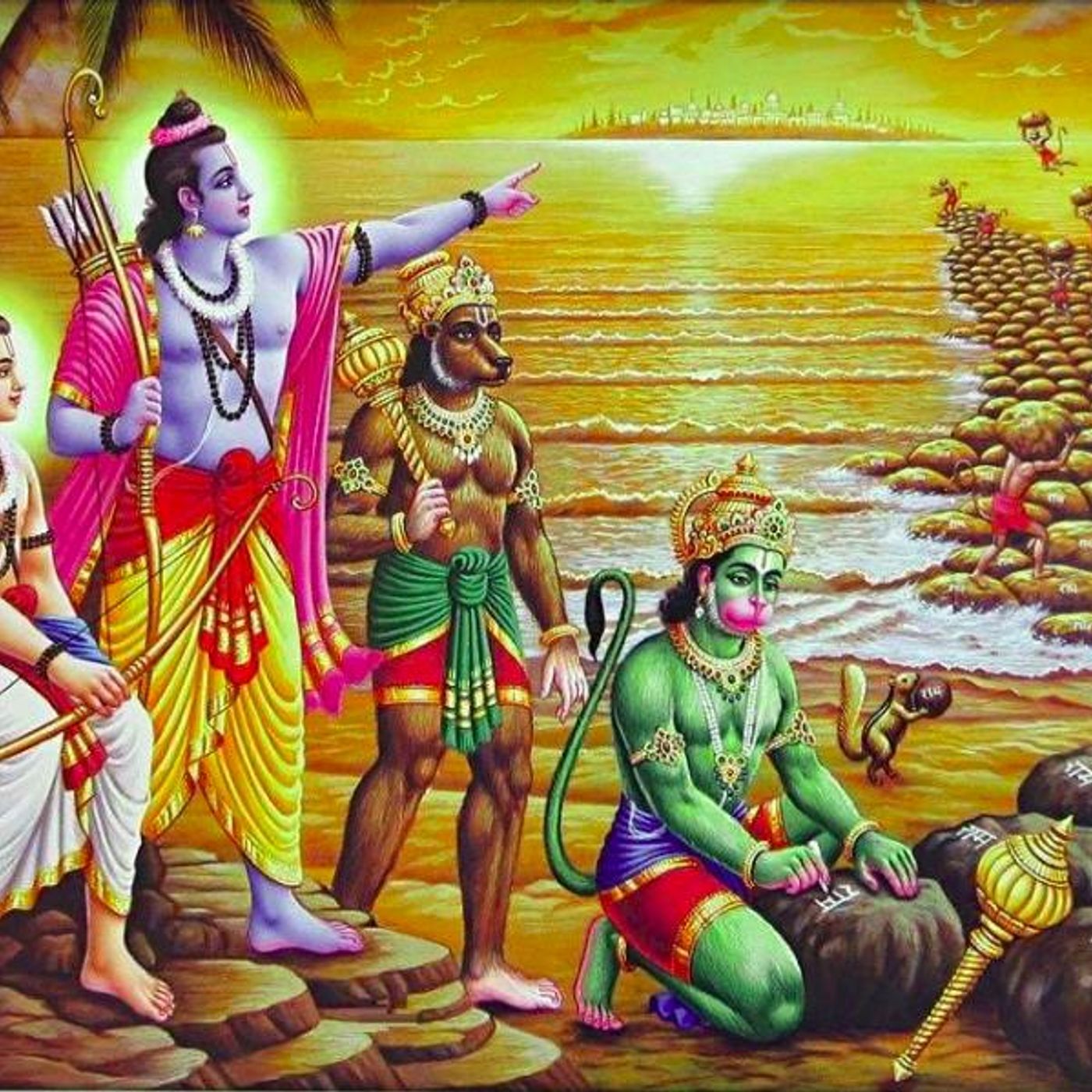Episodes
Rama and Lakshmana while safeguarding the ritual of Sage Vishvamitra for six days and nights, on the last night demons named Maareecha and Subaahu come to hinder the ritual. Rama acts deftly and hits out Maareecha to a long distance, but kills the other, namely Subaahu. Rama thus makes the ritual of sage Vishvamitra a success.
Published 04/11/21
Rama and Lakshmana inquisitively enquired into the Siddhaashrama, Accomplished Hermitage in the earlier chapter for which Sage Vishvamitra informs about the heritage of that hermitage for it once belonged to Vishnu in Vaamna incarnation. Vishvamitra narrates about it and how Vaamna, a dwarfish ascetic boy eradicated evil on earth. It is a suggestion to Rama from Sage Vishvamitra to do likewise in this incarnation of Rama also.
Published 04/11/21
Published 04/11/21
Rama requests sage Vishvamitra for endowing annulment missiles, besides projectile ones that have been accorded in the previous chapter. Sage Vishvamitra accords them, and while they are journeying further, they chance to see a picturesque forest on their way and Rama enquires about it.
Published 04/11/21
Sage Vishvamitra satisfied with the behaviour of Rama in obliging the orders of elders and performing the act that is assigned to him, gives many weapons to Rama, called shastra, astra-s. The weaponry is categorised mainly into two types. One is shastra - a handheld weapon like sword, lance or mace. The other is astra - a projectile missile invoked by reciting hymns. This chapter lists out those missiles that are given to Rama and in next chapter an account of some counter-attack missiles,...
Published 04/11/21
Rama encounters his first problem-female demoness Tataka, also called as Taadaka, and eliminates her at the orders of sage Vishvamitra. This is a crucial test put to Rama by Vishvamitra in ascertaining whether Rama is the follower of dharma through elder men's orders or not. Rama eradicates Tataka basing on his own self-confidence.
Published 04/11/21
Published 03/08/21
Published 03/08/21
Published 03/08/21
Published 03/08/21
Published 03/08/21
Published 01/19/21
On enquiring details about those dangerous demons that are ravaging sage's ritual, King Dasharatha refuses to send young Rama along with Sage Vishvamitra on many an account, and thus confronts the Sage's wrath.
Published 01/12/21
Sage Vishvamitra asks King Dasharatha to send Rama to protect the Vedic ritual that is being conducted by him, from the demons that are constantly disrupting it. The sage asserts King Dasharatha that he and the other sages in Dasharatha's court know the capabilities of Rama and though Rama is in his adolescence, he can easily kill the demons. But Dasharatha is upset at this request.
Published 01/12/21
After the completion of Vedic ritual all the kings and Sage Rishyasringa took leave of Dasharatha and went away to their countries. After some time Rama, Lakshmana, Bharata, and Shatrughna are born. Their virtues in childhood and rituals connected thereto are depicted here. Dasharatha then contemplates the marriages of the princes, since marrying sons after completion of education is customary. At that juncture Sage Vishvamitra arrives at the court of Dasharatha seeking help from the king....
Published 01/12/21
The gods become progenitors Vanara heroes at the dictate of Brahma to come to the aid of Rama in annihilating Ravana. The monkey-like Vanara race is procreated by numerous celestials endowing it with peculiar mighty physique and particular power to come to the help of Rama.
Published 01/12/21
Vishnu agrees to incarnate as human and selects Dasharatha as his father. And when Dasharatha is performing the Vedic ritual called putrakaameSTi a deity called praajaapatya-puruSha arises from the sacrificial fire to give a golden vessel of divine dessert to Dasharatha for distribution among his queens to beget progeny. The three queens on consuming that dessert conceive their children.
Published 01/12/21
King Dasharatha commences the putrakaameSTi ritual aiming to beget progeny, under the aegis of Sage Rishyasringa. The celestial beings gather to receive the oblations offered in the Horse Ritual conducted by King Dasharatha. They are perturbed at the atrocities of Ravana, and request Brahma to think for a way to eliminate Ravana. Vishnu arrives there and pacifies Brahma and other celestials with an assurance that he will incarnate as human to eliminate Ravana.
Published 01/12/21
The Horse Ritual of Emperor Dasharatha is started on the banks of Sarayu River. The details of the arrangements for the participants, and visitors along with some aspects of the Vedic Ritual are narrated.
Published 01/12/21
King Dasharatha requests Sage Vashishta, the Royal Priest to commence works for the Vedic ritual. Sage Vashishta instructs all the concerned about the discipline to be observed in executing the works. Sage Vashishta also instructs the minister Sumantra to invite various kings of other countries, and those kings will be received with great hospitality. King Dasharatha along with his wives takes ritual vow and enters ritual hall.
Published 01/12/21
King Dasharatha requests the Sages to conduct the Vedic ritual for which the sages indent paraphernalia, which the ministers are ordered to supply forthwith. This chapter is almost a replication of chapter 8, excepting the inclusion of references to Sage Rishyasringa who by now is available in Ayodhya.
Published 01/12/21
On the advice of his minister Sumantra, Dasharatha proceeds to Anga kingdom to fetch Sage Rishyasringa and his wife Shanta to his capital Ayodhya.
Published 01/12/21
Sumantra, the minister continues his narration to his king Dasharatha, about Rishyashringa's arrival at Anga kingdom of King Romapaada and his marriage with Princess Shantha, the daughter of Romapada.
Published 01/12/21
Sumantra, the minister of King Dasharatha, details the importance of Sage Rishyasringa and beseeches the king to invite that sage to preside over the contemplated Vedic ritual, for that Sage's entry into any kingdom is auspicious for that land and people.
Published 01/12/21
Dasharatha decides to perform an elaborate Vedic ritual, called Aswamedha yajna, Horse Ritual, to beget children. He being a considerate king in taking conscience of the courtiers, he discusses this aspect with the Vedic scholars and ministers of his court, beforehand.
Published 01/12/21


